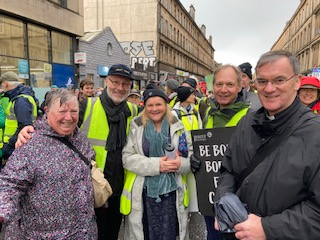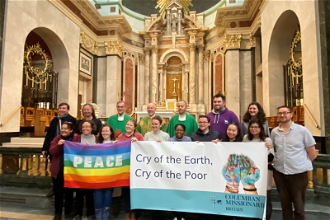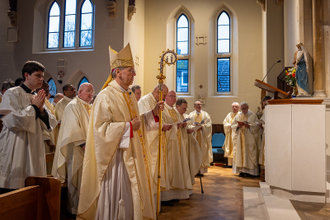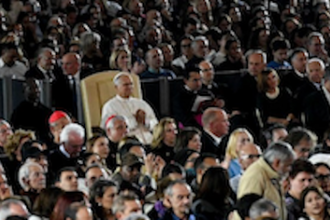COP26 Blog 14: How many COPs to arrest Climate Chaos?

Bishop John Arnold with campaigners
'How many COPs to arrest Climate Chaos?' This clever banner was hung outside the COP26 summit in Glasgow today. In fact, creative banners and dramas over the past two weeks have done an amazing job of summing up key issues amidst the 'summit-speak'.
'No Faith in Fossil Fuels' appeared on Sky News this afternoon and, in an interview, Melanie Nazareth of Christian Climate Action and standing with the banner identified two problems with political leaders. "They don't have the courage to do what needs to be done" she said and "politicians tend to focus on short-termism". A Catholic barrister, she has not only walked from London to Glasgow with Camino to COP but has been part of the Earth Vigil running over the two weeks of the summit. She was speaking amidst widespread disappointment with the latest draft of the summit's concluding statement. Another draft is being prepared at the time of writing.
The frustration outside the summit was inside too. Seve Paeniu, the finance minister of Tuvalu, whom I met last week, called for much stronger pledges on decarbonisation and finance, particularly mechanisms for delivering finance. Speaking in a final stock-take session of nations' delegates he spoke movingly that, "this is a matter of life and survival for many of us and we must not fail." A delegate from the Marshall Islands then said, "I can't accept failure for failure is accepting there isn't a future for my country." After the plenary hundreds of campaigners did a walkout chanting, "Keep 1.5 alive".
Some of us have been here before. I was at the Paris COP21 climate summit of 2015, the year of Laudato Si, and we were just delighted then that there was an Agreement reached, despite its shortfalls. But the move in the right direction did not take away from the failings of the process. Countries in the global south did not have the big, well-resourced negotiating teams of the rich countries and the sheer clout to steer the COP21 Agreement. And lobbyists for the corporate world - including the fossil fuel non-state actors - had access to the meeting rooms where decisions were made, with resources way beyond what non-governmental organisations (NGOs) could muster to influence negotiations. This is what I would call structural sin and little has changed. No wonder much of the text was purely aspirational text, and not legally binding or enforceable.
The great fear now at the conclusion of Cop26 is that the transformation to a low-carbon world will take too long, that an addiction to oil and fossil fuels will not stop, certainly not fast enough, and that we will undermine that web of life that sustains us all.
Yet, significant steps forward are being taken. A US and China joint statement on Enhancing Climate Action in the 2020s is geopolitically significant. And the Beyond Oil and Gas Initiative was launched by Costa Rica and Denmark, with countries and subnational jurisdictions committing to end all new oil and gas projects.
The chorus of NGOs, faith groups, youth groups, indigenous peoples and charities is continuing to step forward as the voice of the people, particularly the poor and vulnerable. There was a rush of online activity this afternoon as the Laudato Si Movement galvanised more than 60 Catholic organisations, missionary groups and prominent Catholics within a few hours to issue a statement on the CO26 draft agreement with a view to strengthening it. It can be found on its website. "We must reach an agreement in Glasgow that sets a clear and ambitious timeline for a just transition away from harmful fossil fuels," said the statement, and "as Catholics, we have other priorities for the final agreement as well, ensuring human rights and environmental safeguards, recognising the rights of Indigenous Peoples and Local Communities and keeping the commitment of 1.5 degrees."
The Vatican Delegation underlined today that time is of the essence and expressed the hope that the final decisions of this Conference "may be inspired by a genuine sense of responsibility towards present and future generations, as well as the care of our common home, and that these decisions may truly respond to the cry of the Earth and the cry of the poor."
Despite disappointment - unless there is more ambitious draft overnight - engagement with the COP process will continue. The United Nations is the closest thing the world has to a global governance platform and one where the smaller nations have a voice. We must persevere with it. Only working collaboratively will eventually secure climate justice. Planning for a more sustainable future in a new era will continue.
Paul Chitnis, Director of Jesuit Missions, stressed that it is "vital that people of faith remain hopeful; there are plenty of grounds for being pessimistic, but I think as people of faith we must always cling to the hope that things can and will be better." That hope, he felt, has come from the demonstrations outside the summit and from the pilgrimages praying for the success of the conference.
LINK
Laudato Si Movement - https://laudatosimovement.org/


















